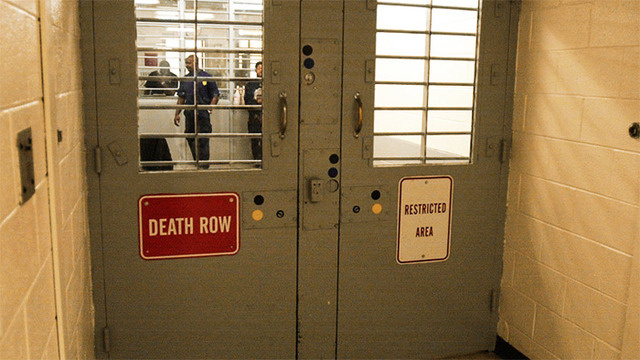My friend fell to the ground and the thug was going to shoot; he was unstoppable. That was it. With the gun in his hand, he had no option. The shots were heard from afar. Now there is a body lying on the floor. Two years after that, my friend is leaving prison. “A police officer should be prepared to deal properly with this kind of situation”, they said. I bet they were never about to die.

Death sentence was quite common almost everywhere in human history. It was well accepted and taken as a fair way of punishing those who were unworthy of life. The definition of what, if anything, could make someone unworthy of life and who, if anyone, could decide someone’s worth have come to discussion mainly since the last century. That discussion inevitably led the parties to argue if capital punishment was ethically acceptable at all, under any circumstances. With people’s heads rolling down public squares’ stairs, both parties did their best to make their arguments highly convincing. Attempting to win the debate, strong and weak arguments were brought up but, with the exception of a handful of insightful ones, most of them fall on one of the three shady categories: Religious, Emotional or Misleading/Based on deceitful information. Regardless of my religious convictions, my emotional attachment to random criminals or wronged families, and my disavowal (or convenience, depending on the situation) of biased information, I will try to be as impartial as possible and analyse the best arguments in favour and against such a practice. But first, let’s see how bad the bad ones are, and then we move towards more reasonable ones.
“Have you ever thought about how many criminals escape punishment, and yet, the victims never have a chance to do that? Are crime victims in the United States today the forgotten people of our time? Do they receive full measure of justice?”
Isenberg, 1977, p. 129
The idea here is that if you kill the guy, justice is being done. Can anyone see the error on that? Justice is just too broad of a concept. Plato wrote Republic, a book composed of other ten books, and couldn’t explain properly and without ambiguity what justice was. Justice is too subjective, something may seem fair for me and at the same time be an outrageous, inhuman barbarity for you. It is as if a threw a party at my house and put a sign on the door saying “Only good-looking people allowed”.
Maintain a prisoner for the rest of his life is way more costly than killing him.
Specifically in the United States, this information is false. But it really doesn’t matter; you could kill people spending just one bullet. This argument is misleading not because of its veracity, but because of its focus. It emphasises an irrelevant area in an ethical debate, finances. That makes people waste a lot of time discussing things that take them nowhere.
We don’t rape rapists or assault assailants, why would we murder murderers.
The uniqueness of capital punishment is always cited in debates, and is weak because if different crimes are suddenly regarded as worthy of death it doesn’t make sense any more. In addition, it does not contribute in anything to the discussion of whether or not is ethically acceptable, being unique or not.
Death penalty provides a sense of closure for victims’ families.
Every family reacts differently. Some families do not think that another death would make things better. It is a weak argument if you think that there is no standard reaction from the families, and that those who were wronged shouldn’t decide the punishment of their wrongdoers because of the strong emotional connection involved. But on the other hand, there is no completely logical explanation for everything in our system and most of things we do are done this way because that’s the way we collectively agree that is more pleasant to us. Why should a robber get three or five or eight years of imprisonment? Because for us that’s what seems more or less ok depending on what else he did. It is no more than a guess. We guess, and if we feel good about it we make it a law.
“Therefore if any man is dangerous to the community and is subverting it by some sin, the treatment to be commended is his execution in order to preserve the common good… Therefore to kill a man who retains his natural worthiness is intrinsically evil, although it may be justifiable to kill a sinner just as it is to kill a beast, for, as Aristotle points out, an evil man is worse than a beast and more harmful.”
Thomas Aquinas, Summa theologiae
Saint Thomas Aquinas, and apparently Aristotle too, approved death sentence as a punishment to those deserving it. Here you see the authority fallacy. We believe a view just because it is expressed by someone regarded as an authority in a certain field. “President Richard Nixon should be re-elected because he has a secret plan to give an end to the war on the South East of Asia”; given that the plan was secret, people couldn’t assess its feasibility and thus the argument was reduced to “We should trust Nixon because he is the president”. I used it up there when I said “justice is super hard to define because Plato couldn’t do it”; just because he couldn’t it doesn’t mean you won’t be able to. These “authorities” committed errors in the past, and they will as surely commit more in the future. Because someone said so is not a good argument.
If we have death sentences people will think twice before killing someone.
hummmmm…. I don’t think so, but that’s tricky to prove. You could argue that in the USA states adept to death penalty do not show lower homicide rates than states averse to it. But that’s a fallacy; you are taking a casualty for a causality. This rate is not influenced only by one variable, but by thousands. Things like culture, climate, city policing, the set of laws for the specific state and many other things deeply influence on the homicide rate. Saying that the sole adoption of death penalty keeps murders’ index high or low is to be too pretentious. On the other hand, I would say that what makes people think twice before performing a barbarian act is more the probability of being caught than the terrible punishment that would be waiting for them.
You are punishing the person twice
This argument is specifically aimed at the USA. There prisoners usually wait for more than a decade for their execution, meanwhile they are kept isolated from other prisoners and are sharply restricted in terms of visitation and exercise.

Prisoners on death row spend as much as 23 hours alone in their cells.
The psychological terror and the years of loneliness are more than enough to destroy anyone’s mental health. That raises the question of whether the prisoner is not being punished twice, and also what is the real purpose of death sentence. The purpose cannot be deterrence, for its unproven effectiveness, it can’t be to free society of the evil by eliminating its propagator, because if society can take 10 years with him caged it can take any amount of time whatsoever, and it can’t be to give families a sense of completion, for it would make a family suffer for 10 years before releasing it of its unfinished matter. Is the purpose of the sentence to give a fair punishment to the convicted criminal or to give him the worst punishment possible, thus combining utter isolation with death sentence?
We don’t have the right to take lives.
Again, that’s too subjective. We take lives every day; we kill flies and ants and most of us are ok with killing cows, chickens and fishes so we could have a nice meal. But ok, let’s stick to taking human lives. Know that friend I spoke about in the beginning of the text? Had he hesitated he wouldn’t have lived to tell me that story. Do you think he didn’t have the right? But if he acted rightly we have to change the initial statement, add an “if”. Let us make a concession: “a person loses their right to life if they start a murderous attack and the only way the victim can save their own life is by killing the attacker”. What if someone started a murderous attack and the only way the victim could save their own life was by killing the attacker, but the victim couldn’t kill the attacker and died. The attacker lost his right to life, does he gain it again when he finishes? Still, it is a super subjective statement. People killed people before, why can’t we do it now? What changed? Or it may be that nothing changed and people never had the right to take other people’s lives but they did it anyway. I didn’t find any completely logical argument for that; it is more an agreement than a rational conclusion.
You could kill a decent person
Although it doesn’t help with the discussion of if it is ethical to kill someone under any circumstances, it is an important point against capital punishment. Death penalty is irreversible and could be applied to an innocent party. People against death penalty like to highlight that many people on death row had their sentences overturned or sent back for review. That sentence gives the idea that someone innocent was about to die. In fact, what generally occurs is that reviews are brought up due to procedural errors instead of uncertainty regarding the accuracy of the conviction. But supporters of death penalty also highlight that no innocent was ever executed. That’s partly because of the long process of appeals and reviews, specifically designed to prevent mistakes, and partly because once you killed the guy no one keeps investigating.

The big problem is that judgements and sentence decisions are made based on evidences and testimonials, and testimonials are rather tricky. Our mind is beautifully designed to fill every void space it finds. And if there is nothing to put there, it makes something up. We have a blind spot in our eyes, one in each; our brain uses the combination of both to make it look like there is no blind spot (here, do the test). The same happens with our mind, if we don’t remember something very well it will make something up to fill the void. I don’t even need to tell you how dangerous it can be when someone’s life is at stake. When your mind is in a greatly stressful situation it can behave quite oddly. You can mistake a black guy for a white guy just because while he was pointing the gun at you, you couldn’t look at anywhere else than the gun. Your brain was was shouting “GUN! DANGER DANGER, GUN, DANGER DANGER, GUN!!”. It is serious business and not all the juries have guys as sensible as this one.
Our minds really play tricks on us. If you don’t believe me, why don’t you do this awareness test and show the world how well your mind works?
The religion paradox
The idea was to think of the subject as a solely rational matter, using only logic arguments. Religious views are not considered valid in this kind of argument because many people have many different religious views, and the basis for a religious argument is only faith; and you could have faith on anything. But here comes the curious thing, without religious connotations death penalty makes no sense at all. Capital punishment is intrinsically based on the assumption that by dying,criminals will have a worse punishment than living in prison. I don’t know if you noticed but there is no logical basement for that. We don’t know how it is like on the other side, except for the information that comes from the three categories we regarded as shady in the beginning of our analysis. Religion, that almost all agree bad people will be punished in the afterlife; Emotions, people generally feel better when something bad happens to a bad person; and Dubious information we get from people who have near death experiences (no resentments, I just don’t believe you guys).
As Master Miyagi said n Karate Kid II: “Daniel-san, for person with no forgiveness in heart, living is worse punishment than death”

Is it necessary?
Just because people did it in the past, it doesn’t mean we can do it now. Life imprisonment is an alternative if you really think this person could never ever go back to society again. And with life imprisonment you could at least make that person contribute to society in some way (through supervised work). As you may notice, arguments opposing death penalty are much more solid and thoughtful that those in favour of it. That’s something to take into consideration.
Know that friend of mine? I spoke to him about jail and what he went through. He told me how prison is not the best place to learn how to love society. He told me how rehabilitation and the importance of a human life are not really the main topics they learn on their day to day in jail. Maybe if we were better at rehabilitating, we wouldn’t need to get rid of people.